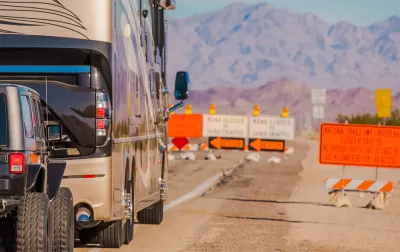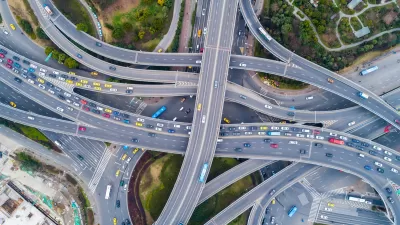Democratic legislators in Nevada are considering a constitutional amendment that would allow the state to use gas tax revenues for transportation projects other than road construction, maintenance, and repair.

According to an article by Riley Snyder, Nevada elected officials are considering a drastic change of transportation funding policy.
[B]etween desires to limit urban sprawl and address root causes of climate change, Nevada lawmakers are considering moving forward with a proposed constitutional amendment that would open up use of gas taxes and other automobile-related fees to more than just road construction and repair.
The amendment would allow gas taxes to be spent on a broader category of "transportation infrastructure. Gas tax revenues are currently limited for "construction, maintenance, and repair" of the state's public highways.
The Interim Legislative Committee on Energy has already voted to move forward with the amendment, reports Riley, although without Republican support.
The proposed constitutional change faces several political hurdles, including opposition to the idea from labor unions and construction associations, which believe that road construction and maintenance funds are already in scant supply in the state. But the discussion about transportation spending fits into larger discussions in the state about how to approach the challenges presented by climate change and population growth:
Urban transit funding and development have become increasingly prominent and pressing issues for state leaders in recent years, given expected population growth over the next decade and attempts by lawmakers and Gov. Steve Sisolak to reduce Nevada’s share of greenhouse gas emissions that contribute to climate change.
Planetizen correspondent Irvin Dawid wrote in August 2019 about Nevada's participation in the Western Road Usage Charge Consortium, which could also pave the way for a drastic change in transportation funding policy by using vehicle miles traveled as the taxing mechanism for drivers.

Maui's Vacation Rental Debate Turns Ugly
Verbal attacks, misinformation campaigns and fistfights plague a high-stakes debate to convert thousands of vacation rentals into long-term housing.

Planetizen Federal Action Tracker
A weekly monitor of how Trump’s orders and actions are impacting planners and planning in America.

San Francisco Suspends Traffic Calming Amidst Record Deaths
Citing “a challenging fiscal landscape,” the city will cease the program on the heels of 42 traffic deaths, including 24 pedestrians.

Defunct Pittsburgh Power Plant to Become Residential Tower
A decommissioned steam heat plant will be redeveloped into almost 100 affordable housing units.

Trump Prompts Restructuring of Transportation Research Board in “Unprecedented Overreach”
The TRB has eliminated more than half of its committees including those focused on climate, equity, and cities.

Amtrak Rolls Out New Orleans to Alabama “Mardi Gras” Train
The new service will operate morning and evening departures between Mobile and New Orleans.
Urban Design for Planners 1: Software Tools
This six-course series explores essential urban design concepts using open source software and equips planners with the tools they need to participate fully in the urban design process.
Planning for Universal Design
Learn the tools for implementing Universal Design in planning regulations.
Heyer Gruel & Associates PA
JM Goldson LLC
Custer County Colorado
City of Camden Redevelopment Agency
City of Astoria
Transportation Research & Education Center (TREC) at Portland State University
Jefferson Parish Government
Camden Redevelopment Agency
City of Claremont





























